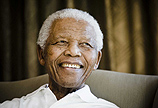Mandela influenced by China's Long March
Not many foreign leaders are written about in Chinese textbooks. But millions of Chinese high school students have learned about Nelson Mandela, who was introduced to them as a true freedom fighter in their English classes.
"Nelson Mandela was a fighter," it says in the chapter titled "Nelson Mandela — a modern hero".
"Instead of bowing down to this unjust system of government, he became a lifelong warrior in the battle to free South Africa. Today, thanks to the sacrifice of Nelson Mandela, apartheid has been outlawed. Everyone in South Africa now has an equal opportunity at home and at work to live comfortably."
Even though the great hero passed away on Thursday, aged 95, his stories and legacy will remain in China, and his name will be remembered by Chinese people.
Mandela said China's modern history and Chinese revolutionary strategy had a strong influence on him.
While he was president of South Africa from 1994 to 1999, China established diplomatic relations with Pretoria in 1998.
In 1992, the then 74-year-old Mandela took his first trip to China as president of the African National Congress. During his visit, the Chinese government contributed $10 million to the ANC and Peking University awarded him an honorary doctorate.
Mandela said he was deeply touched by the sincere welcome and high standard of hospitality he received from the Chinese government. In turn, his sincerity and friendliness moved many Chinese people.
In 1999, a year after China and South Africa established diplomatic relations, Mandela made his second trip to China, this time as president of South Africa.
Liu Guijin was a senior officer in the Department of African Affairs at the Ministry of Foreign Affairs at that time.
In most high-level meetings, government officials usually greeted only their counterparts before conversation began, Liu said.
"But when we participated in the meeting, which then Premier Li Peng held for Mandela, the African president smiled and shook hands, using both of his hands, with all the people in the room. Everyone in that meeting was touched," Liu said.
On his second trip to China, Mandela said China's Long March and the Chinese people, who fought for the liberation and freedom of the whole country, had been a great encouragement to the South African people in their fight against apartheid.
He also expressed his appreciation for all the valuable support South Africa received from the Chinese government and the Chinese people.
After two years as president of South Africa, Mandela announced in 1996 that Pretoria would establish diplomatic ties with Beijing in 1998.
"It did take time for the South African president to make the final decision," Liu noted. "But we were very glad to see him fulfill his promise during his presidential term."
From 2001 to 2007, Liu served as Chinese ambassador to South Africa, which gave him more opportunities to know the great African leader better.
"He once told me that when he was in prison, he and his inmates used to celebrate the Chinese National Day as one of their festivals. They painted Chinese flags on their hands secretly, to encourage each other to fight and achieve success like the Chinese people," he added.
According to Liu, following his second trip to China, Mandela mentioned to the Chinese embassy a few times that he was willing to go on holiday in China, but he was not able to do so because of his health.
In Liu's mind, Mandela was a man of peace. "He spent 27 years in jail but he smiled to the world when he was released. He told others to forgive their oppressors and move on."
Liu is now dean of the China Africa International Business School at Zhejiang Normal University.
Immigrants in South Africa benefited from Mandela's contribution to the country's peace and stability.
"Mandela's death is a huge loss for us. If his governing principles had not been carried out, we would all be in danger. We can say that he was the best protection we had in the country," said Xu Peihua, secretary-general of the police cooperation center in Johannesburg, the first police center for the Chinese community overseas.
Hundreds of thousands of Chinese run businesses in South Africa, but there has been a great deal of bullying and violence against foreign investors and migrant businesspeople that has damaged foreigners' property and interests, including those of Chinese people.
"For most people in South Africa, Mandela, who created a stable and democratic country, was the mainstay of the society. We actually are afraid that following his death, violence will increase and conflicts between different communities will be even worse," Xu added.




























